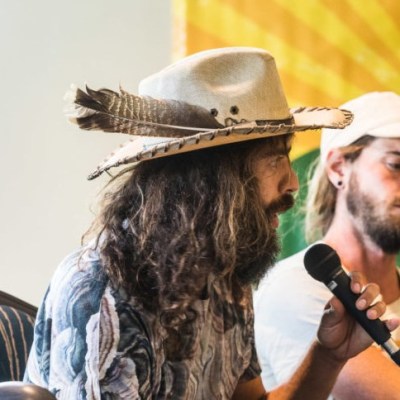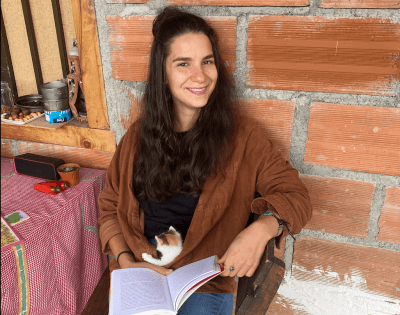Who Are we?
Our Mission
“Bee green with Green Bee.”
To help create a greener future by implementing old school methodologies with new school technologies. Inputs created on the farm, by the farm, for the farm and the greater good.
“We operate a living laboratory where regenerative design meets hands-on building—turning permaculture theory into fertile soil, sound structures, and scalable systems.
In basic economics, a prosperous system consistently creates more value in output than it consumes in inputs; at Green Bee Farms, we apply that principle on a small, regenerative scale by designing systems where land, community, and ecology produce more fertility, food, and resilience than they require to maintain.
At our core, Green Bee Farms operates as a regenerative think tank and living lab—researching, prototyping, and open‑sourcing systems that others can adapt and scale in their own communities.
We design and implement regenerative systems across agriculture, construction, and permaculture—blending ancestral wisdom with emerging technologies to turn research into buildable systems, training into practiced skills, and traditional knowledge into climate‑ready infrastructure. By bridging the knowing‑doing gap, we empower land stewards to design, construct, and manage holistic landscapes where food systems, built environments, and human communities thrive together—restoring soil, sequestering carbon, and generating local prosperity.

The problem
We are living through overlapping crises that all trace back to the same root: we forgot how to live as part of living systems.
Industrial agriculture accelerates climate change, erodes topsoil, and poisons waterways, even as farms go out of business and young people leave rural communities because they see no viable future on the land. Buildings consume enormous energy and resources, yet remain disconnected from local ecology—importing materials from far away while exporting waste, heat, and pollution. Technology is designed in offices far from soil, animals, and weather, solving abstract problems while leaving real farmers and communities behind.
The knowledge to do better already exists. Indigenous peoples have stewarded thriving ecosystems for millennia. Regenerative farmers are proving you can grow more food while rebuilding soil. Natural builders can create healthy, beautiful shelter from local materials. Appropriate technologies can help small farms thrive without locking them into debt.
But this wisdom is fragmented, inaccessible, and often hidden behind paywalls, jargon, or institutional walls. Farmers can’t afford $30,000 design courses or consultants. Builders aren’t taught soil biology. Technologists don’t understand land-based realities. Traditional knowledge is too often extracted without consent or benefit for the communities that hold it. Climate solutions remain boutique and slow-moving while the clock runs out.
We don’t just have a soil crisis, or a rural economic crisis, or a climate crisis, or a spiritual crisis of meaning and disconnection. We have a systems crisis—a broken way of thinking and living that keeps each of these problems separate when, in reality, they are one.
The Solution
Green Bee Farm bridges the knowing‑doing gap by integrating regenerative agriculture, natural building, and appropriate technology into complete systems that can be learned, practiced, and replicated. We operate as a living laboratory and open‑source framework, teaching and demonstrating Natural Farming, holistic grazing, permaculture design, agroforestry, and biodiversity stewardship—turning farm “waste” into fertility, degraded land into living soil, and helping others turn struggling operations into resilient, diversified farms.
Through our emerging sister initiatives—Earthinarts (sustainable construction) and Ptahlabs (regenerative tech)—we plan to prototype homes and infrastructure built from local materials, powered by renewables, and designed to work with water, soil, and climate rather than against them, supported by tools like monitoring, AI‑assisted planning, and carbon measurement that truly serve land stewards. Our education model combines free digital resources with sliding‑scale courses, apprenticeships, and train‑the‑trainer pathways so farmers, builders, and young people become the experts, while honoring indigenous and ancestral knowledge through ethical, reciprocal partnerships.
Economically, we stack regenerative enterprises—food production, fertility products, construction, education, and farm consulting—so that one piece of land can support multiple livelihoods, turning stewardship into a viable career rather than a sacrifice. In short, Green Bee Farms is building a new pattern: places where people learn by doing, live in community with the land, and carry integrated skills back to their regions, reconnecting what should never have been separated: soil and shelter, food and culture, technology and tradition, knowledge and action.
Our Team

Niko
Niko Uman Borrero is the Founder and Executive Director of Green Bee Farms. His passion for farming began in high school when he helped build one of the first carbon-neutral aquaponic facilities in the U.S., and deepened through studies in Agricultural Business and Organic Horticulture at Colorado State University, where he developed expertise in cannabis cultivation and soil science. Working at Way To Grow in Boulder, Niko discovered that many products marketed as “organic” lacked genuine sustainability—a realization that sparked his mission to democratize access to truly regenerative practices. That quest led him to Colombia, where he managed 400 head of cattle and 20,000 tilapia on his uncle’s ranch with minimal resources, ultimately answering the critical question: “How do we make fertilizers for the farm, on the farm?” By applying soil testing, companion planting, and local ingredients to grow 4,000 plants, he gained recognition as a regenerative agriculture innovator, earning second place in Vermont’s “Headies” for his award-winning organic hemp flower. With 8+ years of executive experience bridging production agriculture, sustainable infrastructure, and cooperative governance, Niko now advises transitioning farmers on reducing input costs through regenerative methodologies like homemade fertilizers and animal rotations, while authoring a 150-page handbook on sustainable cattle management and breeding. Fluent in Spanish and trained in regenerative building systems through the EarthShip Academy and Yestermorrow, Niko’s vision extends beyond Vermont to Colombia and indigenous communities—leveraging open-source knowledge sharing, policy advocacy, and emerging technologies to heal thousands of acres of farmland and build a thriving, biodiverse future for our food systems.

Yuri Harris began his journey in regenerative agriculture at age 16, working his way up from farmhand to managing a market garden that supplied fresh vegetables, eggs, and tomatoes to a local diner—where he first discovered his passion for growing food that nourishes communities. This early experience led him to help run a farm camp, teaching children the joy of gardening while learning the fundamentals of crop rotation and cover cropping that would shape his career. Yuri deepened his expertise by earning a Bachelor’s degree in Environmental Science with an emphasis in Soil Science from the University of Vermont, where he simultaneously worked at Full Moon Farms for Vermont’s Lieutenant Governor, helping manage over 15 acres of certified organic produce sold through CSAs and farmers’ markets. At Full Moon Farms, he mastered the art of rotating cover crops to build soil nutrients systematically, rolling cover crops into the ground before and after cash crop plantings—a practice that demonstrates agriculture as soil-building rather than soil-depleting. Recently, Yuri worked throughout Vermont conducting tree identification and inventory for landowners seeking to accrue carbon credits, directly connecting forest stewardship to climate solutions. Through Green Bee Farms, Yuri brings together his soil science expertise, organic farming experience, and carbon sequestration knowledge to advance regenerative practices that heal the land while feeding communities.

Angela
Angela is responsible for the Research Department and NGO specialist. She holds an M.A. in Political Science with an emphasis on Political Economy. During her studies she focused primarily on the goal of sustainability of global agricultural supply chains and improving the livelihoods of smallholder farmers so that they can make a decent living while protecting the environment and contributing to the strength and stability of their communities. In New Zealand, she gained experience in farm work by working on a large-scale Feijoa farm, and in Vermont, she helped grow hemp on a certified organic farm. She also pursued a permaculture certificate in Colombia in 2019, focusing on bioconstruction, companion crops, and the principles of syntropic agriculture. As a researcher she seeks to uplift rural voices with particular attention to issues of climate change-driven land degradation, rural development, and food sovereignty. Within the framework of our project, she studies indigenous approaches to sustainable food systems based on ancestral knowledge and researches ancient recipes for fertilizers, remedies, feeds, etc.

Michael
Michael is a motivational speaker, freestyle poet, rapper, certified breathwork instructor, and transformational coach devoted to guiding others through profound personal transformation. While earning his degree in Health and Exercise Science at Colorado State University, Michael received a powerful vision that catalyzed a decade-long spiritual awakening—diving deep into Vipassana meditation, shamanic plant medicine ceremonies with indigenous elders, somatic modalities, and shadow work to transform wounds into sacred tools. Recognizing that conventional medicine wasn’t his calling, he pivoted toward natural plant healing and regenerative practices, founding Hunab Ku in December 2018—a natural products line rooted in the belief that what we put on our bodies matters as much as what we put in them. When COVID-19 reshaped the world, Michael built an entirely off-grid homestead deep in the Colombian jungle (1 km from civilization, accessible only by mule), designing and maintaining solar power systems, composting toilets, grease traps, and permaculture gardens—a living laboratory for embodied regenerative practices. Through www.Sanatya.org, Michael co-founded a sanctuary for deep transformation where people can remember who they are, reclaim their connection to Source, and awaken the divinity within through breathwork, movement, poetry, music, and radical honesty. Through Green Bee Farms, he extends this mission to the land itself, practicing and teaching regenerative agriculture, circular economy systems, and indigenous knowledge integration—embodying the truth that spiritual transformation and ecological restoration are inseparable.
Extraordinary Experiences
We value the people, animals and plants around us. Attuned to nature, we teach people sustainable methodologies to make the world a greener place.
Our Core Values
- Care for the earth
- Collaboration
- Mimicry
- Resourcefullness
- Sustainability
